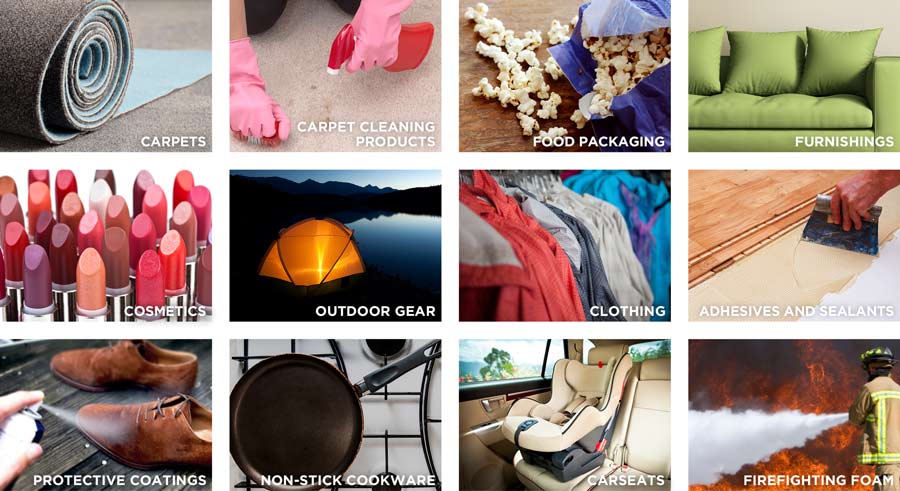What are they?
PFAS, sometimes referred to as PFCs or highly fluorinated chemicals, are used in many consumer products and industrial applications because of their oil-, stain-, and water-repellent properties. Examples of chemicals in this class include PFOA, PFOS, and more than 3000 related compounds.
Where are they found?
PFAS are used in carpets, cleaners, clothing, cookware, cosmetics, food packaging, furnishings, outdoor apparel, paints, papers, protective coatings and sealants, and firefighting foams. Learn more about products that may contain highly fluorinated chemicals.

What are the health concerns?
The most studied of these substances is a chemical called PFOA, which is linked to kidney and testicular cancer, elevated cholesterol, decreased fertility, and thyroid problems and decreased immune response to vaccines in children.
How are we exposed?
Humans are exposed to PFAS through contaminated food, drinking water, and dust. Products in our homes and workplaces that contain these chemicals contribute to our exposure. PFAS are found in the bodies of 98% of Americans.
What are the environmental concerns?
PFAS do not break down in the environment. Because of this extreme persistence, these chemicals are transported around the globe. They travel long distances and pollute even the most remote places.
“Safer” replacements?
Several so-called “long-chain” PFAS were recently phased out due to their potential for health harm. They have been replaced by numerous “short-chain” and other related chemicals that are equally persistent and may pose similar health risks. To prevent such “regrettable substitutions”, the entire class of PFAS should be avoided. For more on this problem, see our flyer “Fluorinated Alternatives: Myths versus Facts.”
What Can You Do?
- Choose textiles and carpeting without water- and stain-repellency.
- Avoid food in contact with greaseproof packaging, such as microwave popcorn and some fast food.
- Avoid personal care products with “perfluor-“, “polyfluor-“, and “PTFE” on the label.
- Purchase cast iron, glass, or ceramic cookware rather than Teflon.
- Only purchase waterproof gear when you really need it.
- Note that “PFOA free” products often use similar chemicals instead.
- Support companies that are committed to phasing out highly fluorinated chemicals.
Want to learn more?
Get more details on PFAS, including notable reports and fact sheets at our Six Classes site.